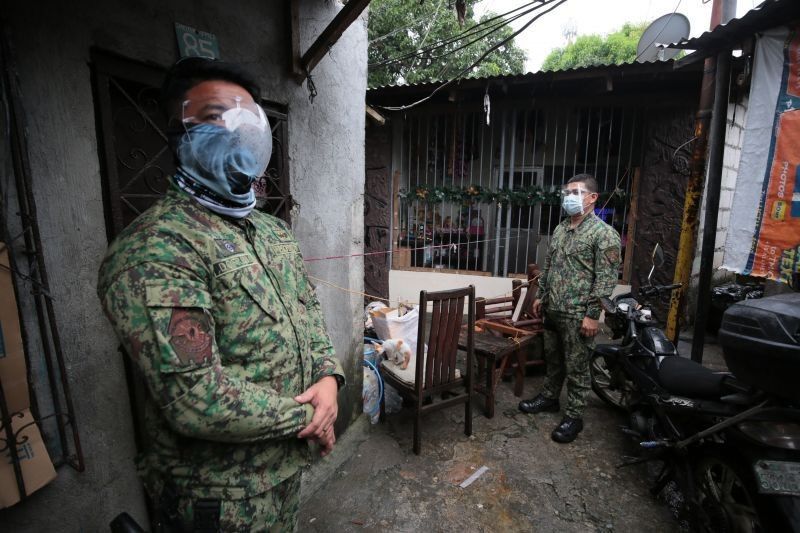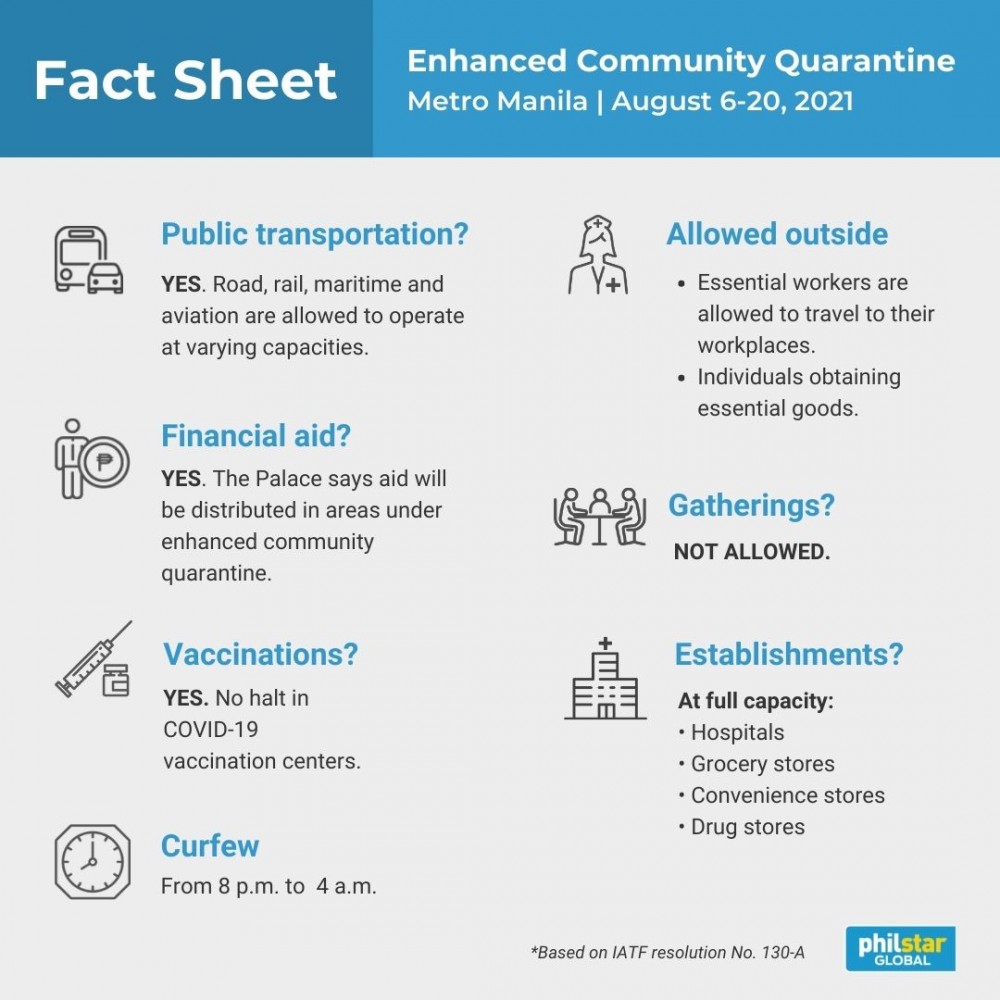August 2021 ECQ guidelines: What to expect as Metro Manila goes into lockdown

MANILA, Philippines (Update 2, 3:24 p.m., Aug. 6) — With the looming threat of the more contagious Delta coronavirus variant, the government buckled under pressure from experts, business leaders and mayors to place Metro Manila under enhanced community quarantine from August 6 to 20.
The government's pandemic task force issued new guidelines just a day before this installment of ECQ over the capital region, Laguna and the cities of Iloilo and Cagayan de Oro became effective, but the general rules remained the same.
Here are ECQ guidelines for the August 2021 ECQ.

What time is the curfew?
Metro Manila's mayors have agreed to impose a curfew from 8 p.m. to 4 a.m. starting August 6.
"When it comes to liquor ban, we are giving the discretion to each [local government unit]. So far, there are LGUs saying they will not implement liquor ban," Metropolitan Manila Development Authority chairperson Benhur Abalos, who announced the curfew, said.
Who should stay at home?
All households should observe strict home quarantine.
People below 18 years old, those who are 65 years old and above, people with immunodeficiency, comorbidity or other health risks, pregnant women must remain in their homes at all times.
They may only leave their homes if they will obtain essential goods and services, or if they will report for work in industries and offices which are allowed to operate even under ECQ, or for other activities permitted under ECQ.
LIST: Authorized persons outside of residence during ECQ
Are gatherings allowed?
Generally, gatherings are not allowed under ECQ. Even gatherings at homes which will include anyone outside of people’s immediate household are not allowed.
Exemptions to this are necrological services, wakes, inurnment and funerals of people who died of causes other than COVID-19, which are allowed to be attended by their immediate family and by religious ministers who will perform religious services.
Also exempted are gatherings essential for the provision of health services, government services, or humanitarian activities authorized by the appropriate government agency or instrumentality.
What establishments will remain operational?
Many establishments will have to shut down during ECQ, but hospitals, grocery stores, convenience stores and drug stores will all be operational at full capacity.
The following establishments will also be operating at full capacity:
- Public and private hospitals
- Health, emergency, and frontline services, including those provided by dialysis centers, chemotherapy centers, HMOs, health insurance providers, disaster risk reduction management officers, and public safety officers, and the like
- Manufacturers of medicines and vitamins, medical supplies, devices, and equipment including suppliers of input, packaging, and distribution
- Industries involved in agriculture (crops, fruits, vegetables, livestock, and poultry), forestry, fishery, and such other components of the food value chain and their workers, including farmers and fisherfolks
- Logistics service providers (delivery and courier services; cargo handling; warehousing; trucking; freight forwarding; shipping, port and terminal operators)
- Essential and priority construction projects, whether public or private, in accordance with the guidelines issued by the Department of Public Works and Highways
- Manufacturing related to food and other essential goods such as but not limited to soap and detergents, diapers, personal hygiene products, toilet paper, and wet wipes, and disinfectants
- Companies that manufacture, distribute, and/or supply equipment or products necessary to perform construction or maintenance works, such as cement and steel, or spare parts
- Essential retail trade and service establishments such as public markets, supermarkets, grocery stores, convenience stores, pharmacies or drug stores, hardware, office supplies, bicycle shops, laundry shops, and water-refilling stations
- Food preparation establishments such as kiosks, commissaries, restaurants, and eateries, but limited to take-out and delivery
- Public and private financial service providers involved in the distribution of government grants and amelioration subsidies
- Business process outsourcing establishments, and export-oriented businesses, including mining and quarrying activities
- Public transport providers and operators
Media establishments will remain operational at 50% capacity.
The following industries will be operational with a skeleton workforce:
- Dental, rehabilitation, optometry, and other medical clinics for the treatment of illness or injuries as long as there is strict observance of infection prevention and control protocols. Dental procedures shall be limited to emergency cases only and dentists must wear full personal protective equipment. Home service therapy for persons with disabilities are allowed.
- Veterinary clinics
- Banks, money transfer services, including pawnshops only insofar as performing money transfer functions, microfinance institutions, and credit cooperatives, including their armored vehicle services, if any
- Capital markets, including but not limited to the Bangko Sentral ng Pilipinas, Securities and Exchange Commission, Philippine Stock Exchange, Philippine Dealing and Exchange Corporation, Philippine Securities Settlement Corporation, and Philippine Depository and Trust Corporation
- Water supply and janitorial/sanitation services and facilities, including waste disposal services, as well as property management and building utility services
- The energy sector (oil, gas, and power companies), their third-party contractors and service providers, including employees involved in electric transmission and distribution, electric power plant and line maintenance, electricity market and retail suppliers, as well as those involved in the exploration, operations, trading and delivery of coal, oil, crude or petroleum and by-products (gasoline, diesel, liquefied petroleum gas, jet oil, kerosene, lubricants), including gasoline stations, refineries, and depots or any kind of fuel used to produce electricity
- Telecommunications companies, internet service providers, cable television providers, including those who perform indirect services such as the technical, sales, and other support personnel, as well as the employees of their third-party contractors doing sales, installation, maintenance, and repair works
- Airline and aircraft maintenance, pilots and crew, and employees of aviation schools for purposes of the pilot’s recurrent training for flight proficiency and type rating using simulator facilities; and ship captains and crew, including shipyard operations and repair
- Funeral and embalming services
- Security personnel licensed by the PNP - Supervisory Office for Security and Investigation Agencies
- Printing establishments authorized by the Bureau of Internal Revenue and other government agencies to print accountable forms and other security documents
- Establishments engaged in repair and maintenance of machinery and equipment, for households and essential permitted establishments
- Establishments engaged in repair and maintenance of motorized and non-motorized vehicles, including the sale of spare parts
- Leasing of real and personal properties
- Employment activities that involve the recruitment and placement for permitted sectors
- Teachers, professors and other staff for purposes of conducting online/offline, and flexible classes, completion of grades, and processing of student credentials, requirements and documents
- Lawyers who will provide legal representation necessary to protect rights of persons as well as legal services for permitted establishments
- All other establishments, to the extent necessary for the buying and selling of consumer goods or services online
Government agencies and instrumentalities will also be fully operational, but with a skeleton work-force on-site and the remainder of the workforce under alternative work arrangements.
Will public transportation be operational?
Yes, public transportation will be operational at 50% capacity, but only authorized persons outside of residence will be allowed to take public transportation.
Will COVID-19 vaccinations continue?
Yes, shots will continue to be administered even under ECQ, according to Malacañang.
Walk-in vaccinees will not be allowed, however, Health Undsecretary Maria Rosario Vergeire said on August 2.
"Walk ins will not be allowed, there will be pre-registration. Magkakaroon po ng strict scheduling para po hindi nagkakaroon ng mass gathering sa ating bakunahan (there will be a strict schedule to avoid mass gatherings at our vaccination sites)," she also said.
She said that local government units should be ready to provide transportation to and from vaccine sites since public transportation will be limited during ECQ.
Will there be financial aid?
The Palace said Monday that it is "sure" that people affected by ECQ in Metro Manila will get financial aid of P1,000 per person or up to P4,000 per household. It is not yet clear where the money will be sourced from.
ALSO READ: What we know so far: 'Ayuda' during NCR lockdown
Malacañang is only saying that President Rodrigo Duterte has given a marching order to source funds for aid to those who would be adversely affected by this lockdown.
— Infographic by Rhovin Luke Manlaqui and Enrico Alonzo
- Latest
- Trending
































